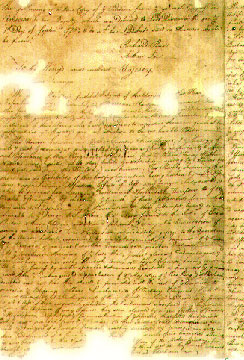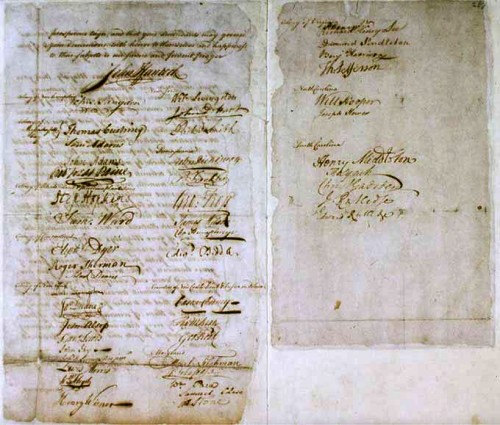
During the Second Continental Congress meeting, a petition called the “Olive Branch Petition” was drafted. The petition was sent to King George III explaining that the colonists only wanted peace and were loyal to the king. However, King George did not give the petition a second glance, or even read it!
“To the King’s Most Excellent Majesty:
MOST EXCELLENT SOVERIEIGN: We your Majesty’s faithful subjects of the colonies of New-hampshire, Massachusetts-bay, Rhode island and Providence plantations, Connecticut, New-York, New-Jersey, Pennsylvania, the counties of New Castle, Kent, and Sussex on Delaware, Maryland, Virginia, North Carolina and South Carolina, in behalf of ourselves and the inhabitants of these colonies, who have deputed us to represent them in general Congress, entreat your Majesty’s gracious attention to this our humble petition.”
Benjamin Franklin, John Jay, Thomas Jefferson, William Livingston, and John Rutledge wrote the first draft of the petition, Benjamin Franklin being the main author. On June 24, 1775, it was presented to Congress. It was not approved by Congress though, and was sent back to be revised.
“Your Majestys ministers persevering in their measures and proceeding to open hostilities for enforcing them, have compelled us to arm in our own defence, and have engaged us in a controversy so peculiarly abhorrent to the affection of your still faithful colonists, that when we consider whom we must oppose in this contest, and if it continues, what may be the consequences, our own particular misfortunes are accounted by us, only as parts of our distress.”
This time, Thomas Jefferson mainly wrote the document. He revised and rewrote it to make it much simpler and straightforward. Jefferson’s draft felt too aggressive and was rewritten once more, this time by John Dickson. On July 5, 1775, Congress approved the document. Then on July 8th, the petition was signed and sent to King George.

When the petition finally reached King George, he refused to even open it. The war had begun officially on April 19, 1775 though the colonists were only trying to avoid a full on war. Because King George publicly refused the document, it only angered the colonist even more.
John Adams wrote a letter to General James Warren that was intercepted and published by the British. In his letter, Adams spoke about how the colonies were clearly ready to fight and win their independence, unlike the petition which spoke of the colonies needing help from the king.
The petition was presented in front of the House of Commons on November 7th, but that was all. Then, the Continental Congress drafted a second document relating to the Olive Branch Petition and published it on December 4th. Once again, King George refused to read it.
Colonists were angry as ever with King George for not reading the letters. This led to the publication of Thomas Paine’s Common Sense then the Declaration of Independence. Perhaps if King George had read the Olive Branch Petition and listened to the colonists, the war may have ended early. America may have never won its independence, or it would have happened later on. But then again, it may have been a good thing King George did not read the document, otherwise our country may not be where it is today. To read the petition click here and to see the original document click here.